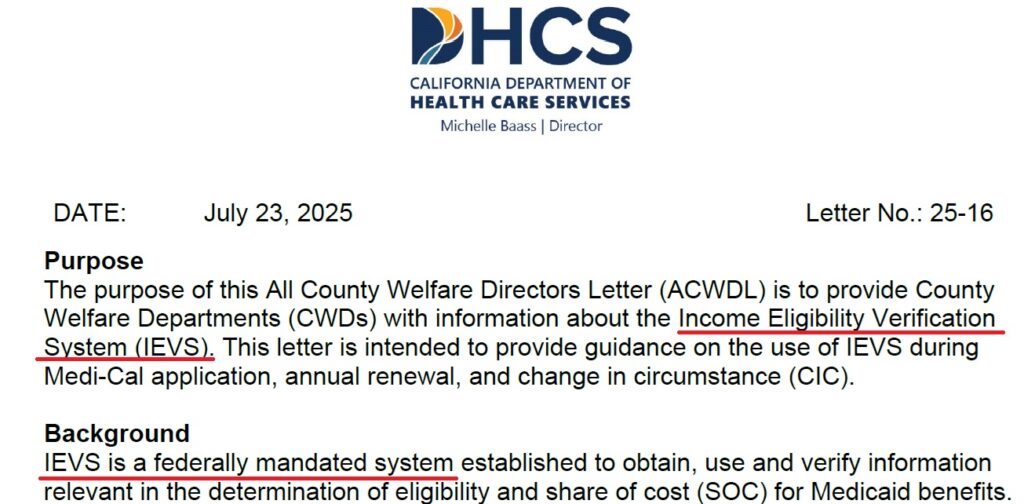For decades, Medi-Cal has verified the income for applicants and renewing beneficiaries using federal and state databases. The process known as the Income and Eligibility Verification System (IEVS). The California Department of Health Care Services has provided county Medi-Cal offices with a reminder of the IEVS process in an All County Welfare Directors Letter, 25-16.

Income Verification for Medi-Cal Eligibility
County Medi-Cal offices screen applicants for a variety of programs that can all have different income thresholds. In addition, eligibility for some programs may be based on income and assets. In general, MAGI Medi-Cal through Covered California only considers income. Non-MAGI Medi-Cal for individuals who are disabled or Medicare, may consider income and assets beginning in 2026. Hence, there are mentions in the letter concerning asset information from the California Franchise Tax Board.
It is important to note that the requests for income information from federal or state databases only occur with the
- Initial application
- Annual renewal
- Change in Circumstances
In addition, not all the requests will have immediate responses. Consequently, a county eligibility worker may request information to reconcile any discrepancies, but the information may not be provided for several days from the government source. It is important to provide the most accurate information to the county Medi-Cal office.
Finally, county Medi-Cal offices must not delay enrollment into Medi-Cal if the individual or family has supplied all the necessary information and documents to establish eligibility. In other words, the IEVS does not supersede Medi-Cal rules regarding timely enrollment.
When an individual or family first applies for Medi-Cal, the following external sources of income information are reviewed.
- Employment Development Department (EDD) Wages
- EDD Unemployment Insurance/Disability Insurance (UI/DI)
- Franchise Tax Board (FTB) Assets (Unearned Income)
- Homeless Indicator
- Social Security Administration (SSA) regarding income Social Security Number verification
- Forty-Quarters Indicator (Quarters is a measurement of eligibility for a variety of programs. For example, to receive Original Medicare Part A for $0, the individual must have accrued 40 quarters of employment of self-employment taxes paid.)
The county eligibility worker will also check internal databases to learn if the applicant is already in the Medi-Cal system or may have other action notices.
Medi-Cal is focused on your current monthly income. Your income to the IRS the previous year is not of paramount concern. Plus, some people have not filed federal income taxes because they either made very little money, or they are still preparing their tax return. Consequently, Medi-Cal relies on the applicant to report on their current income.
At the time of renewal, the letter states, that other databases will be reviewed. For example, if you have Medi-Cal and win the lottery, the county is probably going to learn about it.
Covered California Income Verification
If the individual or family is applying for Medi-Cal through Covered California there is another income verification. The Covered California application known as CalHEERS (California Healthcare Eligibility Enrollment and Retention System) can tap into the Federal Data Services Hub (FDSH). CalHEERS takes the household’s estimated income and compares it to the last filed federal income tax return for the Modified Adjusted Gross Income (MAGI).
The letter states that CEWs [county eligibility workers] can compare self-attested income, found within Covered California, with data found in electronic sources and if the comparison yields reasonable compatibility, no outreach to the applicant is necessary. If the income is not reasonably compatible, the CEW must reach out to the applicant for an explanation or additional proof of income.
Covered California is focused on the household’s annual income for the purposes of the health insurance subsidy. Medi-Cal is focused on the monthly income for eligibility. The monthly income estimate, as calculated in the Covered California application, may be high enough for the adults to receive the health insurance subsidy, but too low for the children. If the children are potentially eligible for Medi-Cal, the county Medi-Cal office will review the income.
Income Verification FAQs
A Frequently Asked Questions section provides additional insight into how county Medi-Cal offices verify income.
Does information in the Application- Income Eligibility Verification System need to be verified if it conflicts with self-attestation?
Yes, if there is significantly different information received from the member and it is not reasonably compatible, the CEW (county eligibility worker) must contact the applicant immediately. Inform them of the IEVS information, which is significantly different from the current or prior applicant information, and request clarification/verification.
How to address income information unavailable in IEVS?
When income is reported by an applicant/member and the county cannot verify it through IEVS, the county would need to verify it through another method. This would include through any other electronic source, a reasonable explanation, or other sources of verification.
Does the New Hire IEVS represent a need to initiate Change in Circumstance (CIC)?
The county should review New Hire IEVS reports. The county should initiate CIC if the reported information significantly impacts the Medi-Cal member’s eligibility or SOC.
Is an IEVS report required for MAGI based applications? (MAGI or Modified Adjusted Gross Income refers to MAGI Medi-Cal usually applied for through Covered California and is based solely on income, NOT assets.)
Yes, CEWs are required to use IEVS for MAGI applicants and members. There are no regulations or guidance that exempt MAGI from IEVS.
Does taking action for information received in IEVS also apply to MAGI when the income has been e-verified?
Yes, when income has been e-verified through the FDSH (Federal Data Services Hub accessed through Covered California), action must be taken if there is an IEVS discrepancy.
Is the FTB (California Franchise Tax Board) match still required since property is no longer a consideration?
Yes, FTB is still required as it contains unearned income information submitted to FTB by banks, insurance companies, financial and investment institutions based in California.





